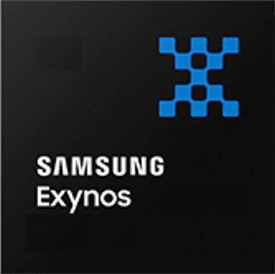
Samsung Exynos 9825 Benchmark, Test and specs
Last updated:
The Samsung Exynos 9825 has 8 CPU cores and can process 8 threads at the same time. The processor was presented in Q3/2019 and is based on the 3. Generation of the Samsung Exynos series. In the Geekbench 5 benchmark, the Samsung Exynos 9825 achieved a result of 731 points (single-core) or 2,098 points (multi-core).

| Name: | Samsung Exynos 9825 |
|---|---|
| Family: | Samsung Exynos (46) |
| CPU group: | Samsung Exynos 9825 (1) |
| Architecture: | Exynos M4/Cortex-A75/-A55 |
| Segment: | Mobile |
| Generation: | 3 |
| Predecessor: | -- |
| Successor: | -- |
CPU Cores and Base Frequency
The Samsung Exynos 9825 has 8 cores. The clock frequency of the Samsung Exynos 9825 is 2.73 GHz. An initial performance assessment can be made using the number of CPU cores.
| CPU Cores / Threads: | 8 / 8 |
|---|---|
| Core architecture: | hybrid (Prime / big.LITTLE) |
| A-Core: | 2x Exynos M4 |
| B-Core: | 2x Cortex-A75 |
| C-Core: | 4x Cortex-A55 |
| Hyperthreading / SMT: | No |
|---|---|
| Overclocking: | No |
| A-Core Frequency: | 2.73 GHz |
| B-Core Frequency: | 2.31 GHz |
| C-Core Frequency: | 1.95 GHz |
Internal Graphics
The Samsung Exynos 9825 has an integrated graphics that the system can use to efficiently play back videos. The Samsung Exynos 9825 has the ARM Mali-G76 MP12 installed, which has 12 streaming multiprocessors (192 shaders).
| GPU name: | ARM Mali-G76 MP12 |
|---|---|
| GPU frequency: | 0.70 GHz |
| GPU (Turbo): | No turbo |
| Compute units: | 12 |
| Shader: | 192 |
| Hardware Raytracing: | No |
| Release date: | Q3/2018 |
| Max. displays: | 2 |
|---|---|
| Generation: | Bifrost 3 |
| Direct X: | 12 |
| Technology: | 7 nm |
| Max. GPU Memory: | 4 GB |
| Frame Generation: | No |
Hardware codec support
Processors with integrated graphics can process video codecs faster. Support for modern codecs can significantly increase system efficiency during video playback.
| h265 / HEVC (8 bit): | Decode / Encode |
|---|---|
| h265 / HEVC (10 bit): | Decode / Encode |
| h264: | Decode / Encode |
| VP8: | Decode / Encode |
| VP9: | Decode / Encode |
| AV1: | No |
|---|---|
| AVC: | Decode / Encode |
| VC-1: | Decode / Encode |
| JPEG: | Decode / Encode |
Memory & PCIeThe Samsung Exynos 9825 supports a maximum of 12 GB memory. Depending on the mainboard, the processor can use a maximum of 4 (Quad Channel) memory channels. This results in a maximum bandwidth of the main memory of --. |
|
| Memory type: | Memory bandwidth: |
|---|---|
| LPDDR4X-1866 | -- |
| Max. Memory: | 12 GB |
| Memory channels: | 4 (Quad Channel) |
| ECC: | No |
| PCIe: | |
| PCIe Bandwidth: | -- |
Thermal ManagementThe Samsung Exynos 9825 has a TDP of . Based on the TDP, the system manufacturer can and must adapt the cooling solution to the processor. |
|
|---|---|
| TDP (PL1 / PBP): | |
| TDP (PL2): | -- |
| TDP up: | -- |
| TDP down: | -- |
| Tjunction max.: | -- |
Technical details
Modern production reduces the waste heat of a processor and increases its efficiency. The Samsung Exynos 9825 is made in 7 nm and has 3.50 MB cache.
| Technology: | 7 nm |
|---|---|
| Chip design: | |
| Socket: | -- |
| L2-Cache: | 1.50 MB |
| L3-Cache: | 2.00 MB |
| AES-NI: | No |
| Operating systems: | Android |
| Virtualization: | None |
|---|---|
| Instruction set (ISA): | Armv8-A (64 bit) |
| ISA extensions: | -- |
| Release date: | Q3/2019 |
| Release price: | -- |
| Part Number: | -- |
| Documents: | Technical data sheet |
Rate this processor
Benchmark results

The benchmark results for the Samsung Exynos 9825 have been carefully checked by us. We only publish benchmark results that have been created by us or that have been submitted by a visitor and then checked by a team member. All results are based on and fullfill our benchmark guidelines.
Geekbench 5, 64bit (Single-Core)
Geekbench 5 is a cross plattform benchmark that heavily uses the systems memory. A fast memory will push the result a lot. The single-core test only uses one CPU core, the amount of cores or hyperthreading ability doesn't count.

|
Intel Core i7-2960XM
4C 8T @ 3.70 GHz |
||

|
Intel Core M-5Y71
2C 4T @ 2.90 GHz |
||

|
MediaTek Dimensity 1080
8C 8T @ 2.60 GHz |
||
|
|
Samsung Exynos 9825
8C 8T @ 2.73 GHz |
||

|
Qualcomm Snapdragon 855 Plus
8C 8T @ 2.96 GHz |
||

|
Intel Core i7-3635QM
4C 8T @ 3.40 GHz |
||

|
Intel Core i7-3630QM
4C 8T @ 3.40 GHz |
||
Geekbench 5, 64bit (Multi-Core)
Geekbench 5 is a cross plattform benchmark that heavily uses the systems memory. A fast memory will push the result a lot. The multi-core test involves all CPU cores and taks a big advantage of hyperthreading.

|
Intel Core i7-870
4C 8T @ 2.93 GHz |
||

|
Intel Atom C5315
4C 4T @ 2.40 GHz |
||

|
Intel Core i3-8145UE
2C 4T @ 2.20 GHz |
||
|
|
Samsung Exynos 9825
8C 8T @ 2.73 GHz |
||

|
AMD EPYC 7281
16C 32T @ 2.70 GHz |
||

|
Samsung Exynos 9820
8C 8T @ 2.70 GHz |
||

|
AMD FX-6350
6C 6T @ 4.20 GHz |
||
Geekbench 6 (Single-Core)
Geekbench 6 is a benchmark for modern computers, notebooks and smartphones. What is new is an optimized utilization of newer CPU architectures, e.g. based on the big.LITTLE concept and combining CPU cores of different sizes. The single-core benchmark only evaluates the performance of the fastest CPU core, the number of CPU cores in a processor is irrelevant here.

|
Intel Pentium Gold G5420
2C 4T @ 3.80 GHz |
||

|
Intel Pentium Gold G5500
2C 4T @ 3.80 GHz |
||

|
Samsung Exynos 1330
8C 8T @ 2.40 GHz |
||
|
|
Samsung Exynos 9825
8C 8T @ 2.73 GHz |
||

|
Intel Xeon D-1528
6C 12T @ 2.50 GHz |
||

|
Intel Pentium G4620
2C 4T @ 3.70 GHz |
||

|
Intel Xeon E5-2687W v2
8C 16T @ 4.00 GHz |
||
Geekbench 6 (Multi-Core)
Geekbench 6 is a benchmark for modern computers, notebooks and smartphones. What is new is an optimized utilization of newer CPU architectures, e.g. based on the big.LITTLE concept and combining CPU cores of different sizes. The multi-core benchmark evaluates the performance of all of the processor's CPU cores. Virtual thread improvements such as AMD SMT or Intel's Hyper-Threading have a positive impact on the benchmark result.

|
Intel Core i5-3550S
4C 4T @ 3.00 GHz |
||

|
Samsung Exynos 9820
8C 8T @ 2.70 GHz |
||

|
AMD Ryzen 5 3500C
4C 8T @ 2.50 GHz |
||
|
|
Samsung Exynos 9825
8C 8T @ 2.73 GHz |
||

|
Intel Core i5-6360U
2C 4T @ 3.00 GHz |
||

|
AMD Ryzen 3 5125C
2C 4T @ 3.00 GHz |
||

|
Intel Core i5-4210H
2C 4T @ 2.90 GHz |
||
iGPU - FP32 Performance (Single-precision GFLOPS)
The theoretical computing performance of the internal graphics unit of the processor with simple accuracy (32 bit) in GFLOPS. GFLOPS indicates how many billion floating point operations the iGPU can perform per second.

|
AMD Opteron X3418
AMD Radeon R7 - 384 (Toronto) @ 0.80 GHz |
||

|
MediaTek Dimensity 1000C
ARM Mali-G57 MP5 @ 0.95 GHz |
||

|
Samsung Exynos 1380
ARM Mali-G68 MP5 @ 0.95 GHz |
||
|
|
Samsung Exynos 9825
ARM Mali-G76 MP12 @ 0.70 GHz |
||

|
Samsung Exynos 9820
ARM Mali-G76 MP12 @ 0.70 GHz |
||

|
Intel Core i5-14400T
Intel UHD Graphics 730 @ 1.55 GHz |
||

|
Intel Core i5-14400
Intel UHD Graphics 730 @ 1.55 GHz |
||
AnTuTu 8 Benchmark
The AnTuTu 8 Benchmark measures the performance of a SoC. AnTuTu benchmarks the CPU, GPU, Memory as well as the UX (User Experience) by simulating browser and app usage. AnTuTu can benchmark any ARM CPU that runs under Android or iOS. Devices may not be directly compareable if the benchmark has been performed under different operating systems.
In the AnTuTu 8 benchmark, the single-core performance of a processor is only slightly weighted. The evaluation consists of the multi-core performance of the processor, the speed of the RAM and the performance of the internal graphics.
In the AnTuTu 8 benchmark, the single-core performance of a processor is only slightly weighted. The evaluation consists of the multi-core performance of the processor, the speed of the RAM and the performance of the internal graphics.

|
MediaTek Dimensity 920
8C 8T @ 2.50 GHz |
||

|
MediaTek Dimensity 930
8C 8T @ 2.20 GHz |
||
|
|
HiSilicon Kirin 990 5G
8C 8T @ 2.86 GHz |
||
|
|
Samsung Exynos 9825
8C 8T @ 2.73 GHz |
||

|
MediaTek Dimensity 1000L
8C 8T @ 2.20 GHz |
||

|
Qualcomm Snapdragon 855
8C 8T @ 2.84 GHz |
||

|
MediaTek Dimensity 1000C
8C 8T @ 2.00 GHz |
||
Estimated results for PassMark CPU Mark
Some of the CPUs listed below have been benchmarked by CPU-monkey. However the majority of CPUs have not been tested and the results have been estimated by a CPU-monkey’s secret proprietary formula. As such they do not accurately reflect the actual Passmark CPU mark values and are not endorsed by PassMark Software Pty Ltd.

|
Intel Core i7-7600U
2C 4T @ 3.90 GHz |
||

|
Intel Core i7-6660U
2C 4T @ 2.40 GHz |
||

|
Intel Core i7-7560U
2C 4T @ 3.70 GHz |
||
|
|
Samsung Exynos 9825
8C 8T @ 2.73 GHz |
||

|
Samsung Exynos 9810
8C 8T @ 2.90 GHz |
||

|
Intel Core i5-7300U
2C 4T @ 3.50 GHz |
||

|
AMD Ryzen 3 2200U
2C 4T @ 2.50 GHz |
||
Benchmarks

Geekbench 5 (SC)
2,488 entries
2,488 entries

Geekbench 5 (MC)
2,461 entries
2,461 entries

Geekbench 6 (SC)
1,755 entries
1,755 entries

Geekbench 6 (MC)
1,703 entries
1,703 entries

FP32 SP (iGPU)
2,026 entries
2,026 entries

AnTuTu 8 Benchmark
118 entries
118 entries

PassMark CPU-Mark
2,392 entries
2,392 entries
Popular comparisons
back to index






